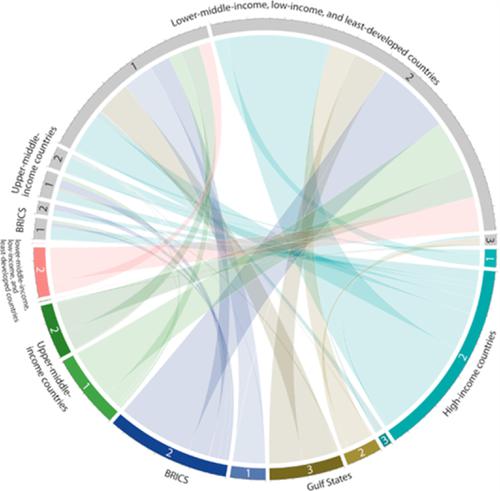当前位置:
X-MOL 学术
›
WIREs Water
›
论文详情
Our official English website, www.x-mol.net, welcomes your feedback! (Note: you will need to create a separate account there.)
Drivers and challenges for transnational land–water–food investments by the Middle East and North Africa region
WIREs Water ( IF 8.2 ) Pub Date : 2020-02-18 , DOI: 10.1002/wat2.1415 Ramy Lotfy Hanna 1
WIREs Water ( IF 8.2 ) Pub Date : 2020-02-18 , DOI: 10.1002/wat2.1415 Ramy Lotfy Hanna 1
Affiliation

|
Over the last decade, transnational land–water investments in farmlands abroad by the Middle East and North Africa (MENA) economies have been adopted as an alternative strategy to address water–food scarcity and security narratives. Large‐scale land acquisitions in farmlands abroad are often attributed to the food and fuel crisis of 2007/8 and 2010/11. Land–water investments entail several drivers and challenges in light of demographic growth trends, physical water stress, commodity market fluctuations, food sovereignty concerns, and climate change uncertainties across diverse countries of the MENA region. Despite the ongoing reliance on virtual water trade to secure their food needs, transnational investments were adopted by MENA economies as an alternative strategy for water–food security. From a political economy standpoint, such investments are founded on state‐capital alliances to achieve both; profit as well as larger strategic objectives. Critical literature attempted to unpack transnational land–water investments through different analytical lenses including accumulation by dispossession, resources grabs, nexus, and water security mercantilism. Yet, the materialization of the investments on the ground go beyond these debates, and is often associated with challenges related to infrastructure, energy, investment climate, labor, as well as other environmental, social, and sovereign risks. Most importantly, land–water–food investments may also entail hydropolitical risks on local, national, and transboundary levels.
中文翻译:

中东和北非地区跨国土地,水,粮食投资的驱动因素和挑战
在过去的十年中,中东和北非(MENA)经济体对国外农田的跨国土地-水投资已被采纳为替代战略,以解决水-粮食短缺和安全问题。国外农田的大规模土地收购通常归因于2007/8和2010/11的粮食和燃料危机。鉴于中东和北非地区各个国家的人口增长趋势,水资源压力,商品市场波动,粮食主权问题以及气候变化的不确定性,土地-水投资带来了若干驱动因素和挑战。尽管一直依靠虚拟水贸易来确保其粮食需求,但中东和北非经济体仍采用跨国投资作为水-粮食安全的替代战略。从政治经济学的角度来看,这些投资建立在州-资本联盟的基础上,以实现两者;利润以及更大的战略目标。批判性文献试图通过不同的分析视角来分析跨国的土地-水投资,包括通过剥夺,资源抢夺,联系和水安全重商主义的积累。然而,实地投资的实现超出了这些辩论,并且常常与基础设施,能源,投资环境,劳动力以及其他环境,社会和主权风险相关的挑战相关。最重要的是,土地,水,粮食投资也可能带来地方,国家和跨界层面的水政治风险。批判性文献试图通过不同的分析视角来分析跨国的土地-水投资,包括通过剥夺,资源抢夺,联系和水安全重商主义的积累。然而,实地投资的实现超出了这些辩论,并且常常与基础设施,能源,投资环境,劳动力以及其他环境,社会和主权风险相关的挑战相关。最重要的是,土地,水,粮食投资也可能带来地方,国家和跨界层面的水政治风险。批判性文献试图通过不同的分析视角来分析跨国的土地-水投资,包括通过剥夺,资源抢夺,联系和水安全重商主义的积累。然而,实地投资的实现超出了这些辩论,并且常常与基础设施,能源,投资环境,劳动力以及其他环境,社会和主权风险相关的挑战相关。最重要的是,土地,水,粮食投资也可能在地方,国家和跨境层面带来水政治风险。并且通常伴随着与基础设施,能源,投资环境,劳动力以及其他环境,社会和主权风险相关的挑战。最重要的是,土地,水,粮食投资也可能在地方,国家和跨境层面带来水政治风险。并且通常伴随着与基础设施,能源,投资环境,劳动力以及其他环境,社会和主权风险相关的挑战。最重要的是,土地,水,粮食投资也可能在地方,国家和跨境层面带来水政治风险。
更新日期:2020-02-18
中文翻译:

中东和北非地区跨国土地,水,粮食投资的驱动因素和挑战
在过去的十年中,中东和北非(MENA)经济体对国外农田的跨国土地-水投资已被采纳为替代战略,以解决水-粮食短缺和安全问题。国外农田的大规模土地收购通常归因于2007/8和2010/11的粮食和燃料危机。鉴于中东和北非地区各个国家的人口增长趋势,水资源压力,商品市场波动,粮食主权问题以及气候变化的不确定性,土地-水投资带来了若干驱动因素和挑战。尽管一直依靠虚拟水贸易来确保其粮食需求,但中东和北非经济体仍采用跨国投资作为水-粮食安全的替代战略。从政治经济学的角度来看,这些投资建立在州-资本联盟的基础上,以实现两者;利润以及更大的战略目标。批判性文献试图通过不同的分析视角来分析跨国的土地-水投资,包括通过剥夺,资源抢夺,联系和水安全重商主义的积累。然而,实地投资的实现超出了这些辩论,并且常常与基础设施,能源,投资环境,劳动力以及其他环境,社会和主权风险相关的挑战相关。最重要的是,土地,水,粮食投资也可能带来地方,国家和跨界层面的水政治风险。批判性文献试图通过不同的分析视角来分析跨国的土地-水投资,包括通过剥夺,资源抢夺,联系和水安全重商主义的积累。然而,实地投资的实现超出了这些辩论,并且常常与基础设施,能源,投资环境,劳动力以及其他环境,社会和主权风险相关的挑战相关。最重要的是,土地,水,粮食投资也可能带来地方,国家和跨界层面的水政治风险。批判性文献试图通过不同的分析视角来分析跨国的土地-水投资,包括通过剥夺,资源抢夺,联系和水安全重商主义的积累。然而,实地投资的实现超出了这些辩论,并且常常与基础设施,能源,投资环境,劳动力以及其他环境,社会和主权风险相关的挑战相关。最重要的是,土地,水,粮食投资也可能在地方,国家和跨境层面带来水政治风险。并且通常伴随着与基础设施,能源,投资环境,劳动力以及其他环境,社会和主权风险相关的挑战。最重要的是,土地,水,粮食投资也可能在地方,国家和跨境层面带来水政治风险。并且通常伴随着与基础设施,能源,投资环境,劳动力以及其他环境,社会和主权风险相关的挑战。最重要的是,土地,水,粮食投资也可能在地方,国家和跨境层面带来水政治风险。


























 京公网安备 11010802027423号
京公网安备 11010802027423号